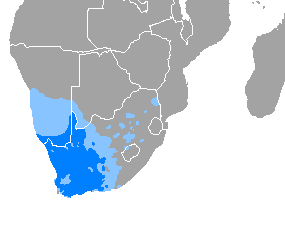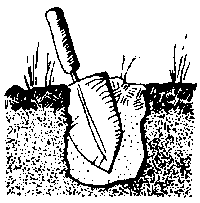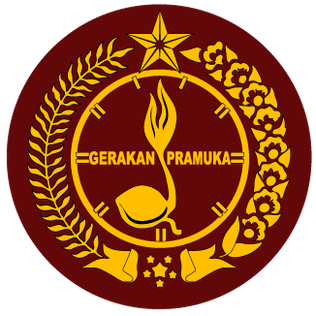

A hudo is a temporary pit toilet in a camp, covered with a tarpaulin, not a permanent outhouse. The name is in common use in Dutch and Belgian scouting, and has international usage.


A hudo is a temporary pit toilet in a camp, covered with a tarpaulin, not a permanent outhouse. The name is in common use in Dutch and Belgian scouting, and has international usage.
The word hudo is derived from the Urdu word howdah , which is the covered carriage on elephants. [1]
Other popular etymological explanations include the acronym of houd uw darmen open (the Dutch parallel to "kybo", "keep your bowels open"), and the contraction of hurkdoos (Dutch for "squat loo"). The validity of these explanations is questioned. [1]

Afrikaans is a West Germanic language, spoken in South Africa, Namibia and Botswana, Zambia and Zimbabwe. It evolved from the Dutch vernacular of South Holland spoken by the predominantly Dutch settlers and enslaved population of the Dutch Cape Colony, where it gradually began to develop distinguishing characteristics in the 17th and 18th centuries.

Microsoft Word is a word processor program developed by Microsoft. It was first released on October 25, 1983, under the name Multi-Tool Word for Xenix systems. Subsequent versions were later written for several other platforms including: IBM PCs running DOS (1983), Apple Macintosh running the Classic Mac OS (1985), AT&T UNIX PC (1985), Atari ST (1988), OS/2 (1989), Microsoft Windows (1989), SCO Unix (1990), macOS (2001), Web browsers (2010), iOS (2014) and Android (2015).

Scouting, also known as the Scout Movement, is a worldwide youth social movement employing the Scout method, a program of informal education with an emphasis on practical outdoor activities, including camping, woodcraft, aquatics, hiking, backpacking, and sports. Another widely recognized movement characteristic is the Scout uniform, by intent hiding all differences of social standing in a country and encouraging equality, with neckerchief and campaign hat or comparable headwear. Distinctive uniform insignia include the fleur-de-lis and the trefoil, as well as merit badges and other patches.

A sled, skid, sledge, or sleigh is a land vehicle that slides across a surface, usually of ice or snow. It is built with either a smooth underside or a separate body supported by two or more smooth, relatively narrow, longitudinal runners similar in principle to skis. This reduces the amount of friction, which helps to carry heavy loads.

Girl Scouts of the United States of America (GSUSA), commonly referred to as Girl Scouts, is a youth organization for girls in the United States and American girls living abroad. It was founded by Juliette Gordon Low in 1912, a year after she had met Robert Baden-Powell, the founder of Scouting.

Kraal is an Afrikaans and Dutch word, also used in South African English, for an enclosure for cattle or other livestock, located within a Southern African settlement or village surrounded by a fence of thorn-bush branches, a palisade, mud wall, or other fencing, roughly circular in form. It is similar to a boma in eastern or central Africa.

The Scout Promise is a spoken statement made by a child joining the Scout movement. Since the publication of Scouting for Boys in 1908, all Scouts and Girl Guides around the world have taken a Scout promise or oath to live up to ideals of the movement, and subscribed to a Scout Law. The wording of the Scout Promise and Scout Law have varied slightly over time and from country to country. Although most Scouting and Guiding organizations use the word "promise", a few such as the Boy Scouts of America tend to use "oath" instead.

A cathole or cat hole or sometimes pighole is a pit for human feces. Catholes are frequently used for the purpose of disposing of bowel movements or waste water by hikers and others engaging in outdoor recreation.

Scouting Nederland is the national Scout organisation of the Netherlands with approximately 110,000 members (53,324 male and 54,663 female, 87,000 youth members, as of 2010.

The Bharat Scouts and Guides (BSG) is the national Scouting and Guiding association of India. The national headquarters of BSG is recognised by the Government of India.

The Kenya Scouts Association is the national Scouting association of Kenya. Scouting was founded in British East Africa in 1910 and became a member of the World Organization of the Scout Movement in 1964. It has 323,929 members.

The Pramuka Movement of Indonesia, officially the Praja Muda Karana Scouting Movement, is the national scouting organization of Indonesia. Scouting was founded in the Dutch East Indies in 1912, and Indonesia became a member of the World Organization of the Scout Movement (WOSM) in 1953. Regulated by the Pramuka Movement Act of 2010, all elementary and secondary schools must operate a scouting program; and membership was compulsory for students in elementary and secondary schools from 2013 to 2024. It has 25.272.760 members, making it the world's largest Scout association.

Gidsen- en Scoutsbeweging in België (Dutch) or Guidisme et Scoutisme en Belgique (French) (GSB) is the national Guiding and Scouting federation in Belgium. Scouting in Belgium started in 1911, and Guiding followed in 1915. The Belgian Scouts were among the charter members of the World Organization of the Scout Movement (WOSM) in 1922, and the Guides were one of the founding members of the World Association of Girl Guides and Girl Scouts (WAGGGS) in 1928. The federation counts 121,600 Scouts and 59,268 Guides.

The Brownsea Island Scout camp was the site of a boys' camping event on Brownsea Island in Poole Harbour, southern England, organised by Lieutenant-General Baden-Powell to test his ideas for the book Scouting for Boys. Boys from different social backgrounds participated from 1 to 8 August 1907 in activities around camping, observation, woodcraft, chivalry, lifesaving and patriotism. The event is regarded as the origin of the worldwide Scout movement.

Religion in Scouting and Guiding is an aspect of the Scout method that has been practiced differently and given different interpretations in different parts of the world over the years.

Scouting for Boys: A handbook for instruction in good citizenship is a book on Boy Scout training, published in various editions since 1908. Early editions were written and illustrated by Robert Baden-Powell with later editions being extensively rewritten by others. The book was originally a manual for self-instruction in observation, tracking and woodcraft skills as well as self-discipline and self-improvement, about the British Empire and duty as citizens with an eclectic mix of anecdotes and unabashed personal observations and recollections. It is pervaded by a degree of moral proselytizing and references to the author's own exploits. It is based on his boyhood experiences, his experience with the Mafeking Cadet Corps during the Second Boer War at the siege of Mafeking, and on his experimental camp on Brownsea Island, England.

Gulf Stream Council is a council of the Boy Scouts of America in southeast Florida with the headquarters in Palm Beach Gardens. Founded in 1914, the Gulf Stream Council serves Scouts in Palm Beach, Martin, St. Lucie, Indian River, Okeechobee, Glades and Hendry counties. Throughout its area, it serves over 24,000 youth.

Dutch is a West Germanic language, spoken by about 25 million people as a first language and 5 million as a second language and is the third most spoken Germanic language. In Europe, Dutch is the native language of most of the population of the Netherlands and Flanders. Dutch was one of the official languages of South Africa until 1925, when it was replaced by Afrikaans, a separate but partially mutually intelligible daughter language of Dutch. Afrikaans, depending on the definition used, may be considered a sister language, spoken, to some degree, by at least 16 million people, mainly in South Africa and Namibia, and evolving from Cape Dutch dialects.

Scout Moor Wind Farm is the second largest onshore wind farm in England. The wind farm, which was built for Peel Wind Power Ltd, produces electricity from 26 Nordex N80 wind turbines. It has a total nameplate capacity of 65 MW of electricity, providing 154,000 MW·h per year; enough to serve the average needs of 40,000 homes. The site occupies 1,347 acres (545 ha) of open moorland between Edenfield, Rawtenstall and Rochdale, and is split between the Metropolitan Borough of Rochdale in northern Greater Manchester and the Borough of Rossendale in south-eastern Lancashire. The turbines are visible from as far away as south Manchester, 15–20 miles (24–32 km) away.
This article covers the phonology of the Orsmaal-Gussenhoven dialect, a variety of Getelands spoken in Orsmaal-Gussenhoven, a village in the Linter municipality.